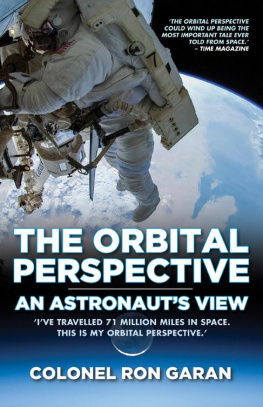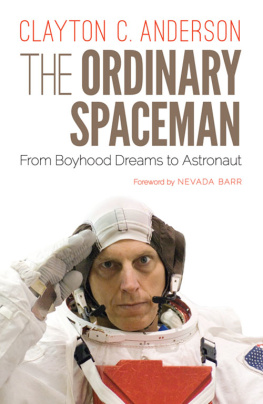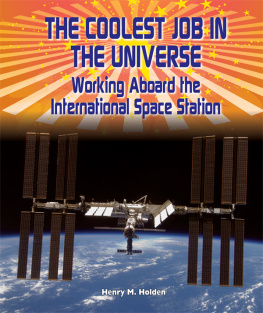THE ORBITAL PERSPECTIVE
On the cover is a photo that my crewmate and space walking partner Mike Fossum took of me while I was in the cupola of the International Space Station. The photo was taken from the Russian docking compartment Pirs as we passed over coastal Australia.
I have always called this picture Downside Up Down Under. Peter Gabriel inspired the name of the photo through the many discussions he and I have had, both on Earth and while I was in space, about the nexus between space, music, culture, and the orbital perspective. Peters song Downside Up and his explanation of the song perfectly capture the sentiment of the photo and the essence of the orbital perspective: At one point the world turns upside down, and you have to imagine lying on a field of grass and looking up at the sky long enough that you start to see the sky as down, as an ocean below you, and that is the state downside up.
Downside up, upside down
Take my weight from the ground
Falling deep in the sky
Slipping in the unknown
All the strangers look like family
All the family looks so strange
The only constant I am sure of
Is this accelerating rate of change
I stand here
Watch you spinning
Until I am drawn in
A centripetal force
You pull me in
PETER GABRIEL
THE ORBITAL PERSPECTIVE
Lessons in Seeing the Big Picture from a Journey of Seventy-One Million Miles
ASTRONAUT
RON GARAN

The Orbital Perspective
Copyright 2015 by Ronald J. Garan, Jr.
All rights reserved. No part of this publication may be reproduced, distributed, or transmitted in any form or by any means, including photocopying, recording, or other electronic or mechanical methods, without the prior written permission of the publisher, except in the case of brief quotations embodied in critical reviews and certain other noncommercial uses permitted by copyright law. For permission requests, write to the publisher, addressed Attention: Permissions Coordinator, at the address below.
|
|---|

| Berrett-Koehler Publishers, Inc.
1333 Broadway, Suite 1000
Oakland, CA 94612-1921
Tel: (510) 817-2277, Fax: (510) 817-2278
www.bkconnection.com |
Ordering information for print editions
Quantity sales. Special discounts are available on quantity purchases by corporations,
associations, and others. For details, contact the Special Sales Department at the
Berrett-Koehler address above.
Individual sales. Berrett-Koehler publications are available through most bookstores. They
can also be ordered directly from Berrett-Koehler: Tel: (800) 929-2929; Fax: (802) 864-7626;
www.bkconnection.com
Orders for college textbook/course adoption use. Please contact Berrett-Koehler:
Tel: (800) 929-2929; Fax: (802) 864-7626.
Orders by U.S. trade bookstores and wholesalers. Please contact Ingram Publisher
Services, Tel: (800) 509-4887; Fax: (800) 838-1149; E-mail: customer.service@ingram
publisherservices.com; or visit www.ingrampublisherservices.com/Ordering for details
about electronic ordering.
Berrett-Koehler and the BK logo are registered trademarks of Berrett-Koehler
Publishers, Inc.
First Edition
Hardcover print edition ISBN 978-1-62656-246-2
PDF e-book ISBN 978-1-62656-247-9
IDPF e-book ISBN 978-1-62656-248-6
2014-1
Produced and designed by BookMatters; copyedited by Todd Manza; indexed by Leonard
Rosenbaum; proofed by Janet Blake. Cover design by Steve Pisano. Front cover photo by
Mike Fossum and reproduced courtesy of NASA.
To my family: my wife, Carmel, and our sons, Ronnie,
Joseph, and Jake. Thank you for being my inspiration
and for enabling me and accompanying me on this
incredible journey. And to all those laboring to make life
on Earth as beautiful as our planet looks from space.
CONTENTS
FOREWORD
As you read of Rons discovery of his lifes goal and purpose during his time in space, I hope you will also reflect on your own lifes goal and purpose here on Earth. What are the problems you consider impossible to solvehunger, poverty, war, environmental issuesand how can you gather together with others to solve these problems? Use Rons idea of the orbital perspective as a way to erase obstacles, boundaries, and resistance to any problem.
If you had asked bankers thirty years ago whether a bank could lend billions of dollars to millions of extremely poor women in a country like Bangladesh without any collateral and with nearly a one hundred percent repayment rate, they would have laughed at you! Today, this is done globallyeven in New York, San Francisco, and Los Angelesand is a tested tool to counter poverty and give self-reliance. Another kind of business, a nondividend business, is becoming popular globally to address problems that were never considered amenable to sustainable solutions by business methods. What other tools can you discover if you put your mind and heart into the question?
Ron has shared with us his unlimited view of Earths possibilities from the vantage point of the International Space Station. May we use this beautiful perspective for the good of all with whom we share our beautiful home, this fragile oasis known as Earth.
Muhammad Yunus
Nobel Peace Laureate
PREFACE
I have wanted to write this book since returning to Earth from my first space mission in 2008. Launching on Space Shuttle Discovery fulfilled of a lifelong dream of flying in space. It also marked the start of another questa quest that would lead me to reject the status quo on our planet, a quest to help reduce the sobering contradiction we see when we look at our planet from space, and a quest to help make life on Earth as beautiful as the visible beauty of this planet when seen from space.
I returned from that mission with a compelling need to share a profound feeling of hope that was singed into my awareness from the experience. I call this awareness the orbital perspective, and this awareness came with a responsibility to highlight the need for effective global collaboration. My goal in writing this book is to spark changevery simple, but exponentially powerful change. I was compelled by a simple idea: our world still faces numerous problems because we have not, to date, learned how to work together. But I believe that the entire landscape of our society is changing, making available powerful collaborative tools that can engage the collective genius of our global society like never before. We are living in times of unprecedented interconnectednessan interconnectedness that empowered a fruit vendor in Tunisia to spark a collective movement that has changed the world.
We live in a world where exponentially increasing technological advancements and interconnectivity are making the impossible possible on a daily basis. Commonly held beliefs about whats possible and whats not are being overcome by events. We do not have to accept that the suffering and conflict on our planet are inescapable. I believe we live in a world where the possibilities are endless and limited only by our imagination and our will to act. The secret to achieving these critical things is to pull back to the point where we can see all the pieces of the puzzle and how they fit together, and where it also becomes apparent that our own backyard is bigger than we think. Our sphere of influence is in fact global. This is the orbital perspective.
Next page






